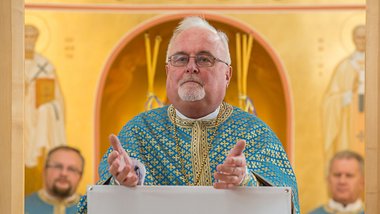Expert Opinion: Cabinet of Ministers again considers introducing direct control of religious processes in the country
Liudmyla FYLYPOVYCH, doctor of philosophy, head of the Department of Religious Processes in Ukraine of the Institute of Philosophy of the National Academy of Sciences of Ukraine, executive director of the Center of Religious Information and Freedom of the Ukrainian Association of Religious Studies Experts
The news of the establishment of Ukraine’s State Committee on Matters of Nationalities and Religions was not a surprise to anyone. Relations between state and church in such a configuration already existed, therefore there is no special tension regarding the change of format of an “ever-living” institution. The state committee fulfilled its mission in its time. Whether it was beneficial or harmful for Ukraine and believers is another question.
Therefore, society has both supporters of the retention of a state governing body in the field of religion and its opponents. The arguments of both parties are quite weighty. In fact, the resolution of the Cabinet of Ministers of 8.11.2006 can be considered a positive thing, as it indicates that the authorities are concerned about the condition of interreligious and church-state relations in Ukraine. The established or rather resuscitated committee will just facilitate improvement of the situation. However, it is difficult to talk about its powers now, for, according to the respective regulation of the Cabinet of Ministers, they will be determined by a special regulation within two months. But it is already clear that, with this step, the Cabinet of Ministers of Ukraine confirmed its wish to introduce direct control of religious and ethno-national processes in the country as in the time of [former President] L[eonid] Kuchma.
A strong governing structure is needed when there are problems which cannot be solved in a democratic way by the strength of civil society, when all the subjects of a conflict are not able to exit the situation of confrontation independently. The state actually recognizes the weakness of the national-religious environment, demonstrates mistrust for it, expresses doubts as to the ability of the latter to find ways out of crises independently. This is exactly why the intention of the state to act as a mediator in the settlement of, primarily, inter-Orthodox and interdenominational confrontations is an indication of the victory of statist sentiments and values in society, the supremacy of the interests of the state and not of the person or their associations in the church.
The first signs of the democratization of religious life, reflected in the establishment of independent, voluntary, self-governed interchurch associations, conventions, societies, and so on, an increase of the church’s authority and attention to its position in society can turn out to be the opposite for Ukraine, a restoration of the old, not quite democratic model of relations with the state. Much, however, will depend on the powers of the committee and its head, especially, the denominational and ecclesiastical orientations of the latter. But one can already predict that the traditional churches have nothing to worry about: the advance trust granted to them by citizens of Ukraine as to historically-established religious communities will continue for a long time to be their protective shield from possible surprises of state initiative to unite or separate anyone from another, insisting on friendship, dialogue, demanding support of the state policy of cooperation with Russia or Europe or the USA. The traditional churches have experience of coexistence with a totalitarian state, therefore they will return to the practice of lobbying their interests through the state committee and restore the unwritten hierarchy of churches in the eyes of the state. It is difficult to predict what kind of relations will be built between the state and those churches and religions which never were in favor with the state and survived only due to the proclaimed principle of freedom of worship and faith and the equality of all churches before the law, thanks to the unceasing control of rights-protecting organizations and believers of non-dominant churches. We hope that 15 years of struggle for the retention of the equality of all religions, the right to choice of faith by each citizen, and experience gained in difficult battles for freedom, including freedom of worship, will become the guarantor which will keep Ukraine on the track of democratic processes.









